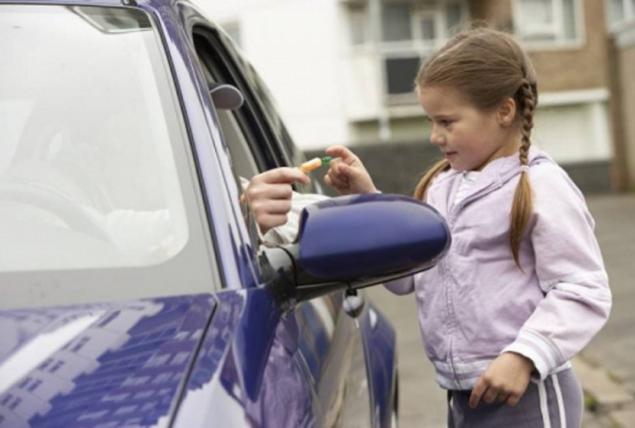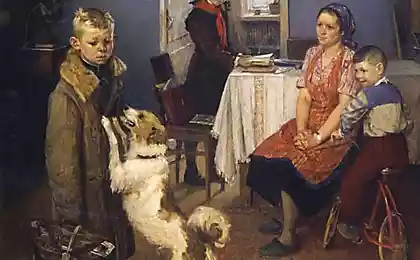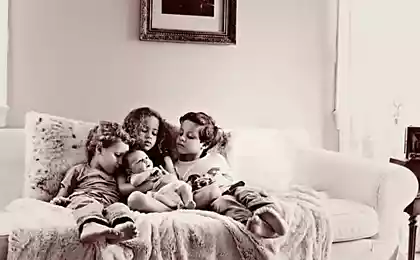522
Fatal Error parents who helps scoundrels steal children
Mom and Dad, I talk to you for three minutes, and it's very, very important.

Leah balls. Head of "Stop-threat" center:
During 2014-2015, I spent at least a hundred training sessions on security, and possibly much more, so at least 2000 - 3000 children have told me about how they imagine the perpetrator, whom they help in the street, with whom will not hesitate, and they would do in case of danger.
I will share the conclusions based on accurate statistics:
9 out of 10 children 7-9 years old do not know by heart the number of parents phone. Think about what could happen if your child will stay in the street without their mobile phone, it will contact you?
19 of the 20 children of all ages spend polite aunt to the nearest shop, school, bus stop. In some classes of hands raised, without exception.
19 of the 20 children of all ages to help an elderly uncle to convey to the machine package, puppy, kitten, briefcase, bag.
At the same time 10 of the 10 elementary school students believe the elderly man fifty years. First-graders are ready to be written in the "old" and forties. A seniors' need help ».
19 of 20 first-graders-vtoroklashek and about half of children 10-14 years old are confident that can easily recognize a criminal street (dressed in black, eerie, hiding, "strange looks", it comes with a big bag, behaves unusually, artfully unnatural He is smiling, luring sweet, slovenly man 30-35 years old, like a tramp or a criminal).
At least half of the children will run in case of danger to the porch, into the yard, somewhere "where you can hide».
All the children feel that they can trust "familiar to adults', including neighbors, parents of friends, vendors from the nearby store - all the people, whom they had once seen
. 19 out of 20 children will go absolutely anywhere with anyone who calls them by name.
19 of the 20 children of all ages hesitate to loudly shout, "Help! I do not know the man! "If someone will take them by the hand and lead somewhere.
And this is only part of a very grim statistics.
And the most important point is this: let's eliminate from conversations with our children about the possible dangers of the word "suspicious»
. This criminal who can lead your child - not suspicious. He - not the most suspicious of the passers-by often. It's polite, smiling, well-dressed man, it's a pretty woman or a neat little old man.
Tell your children that "suspicious" criminals exist only in the movies and on television crime news.
A child should only trust family members and teachers, perhaps the cross and a close family friend. And no one else.
All the others - outsiders who should not approach your child or with a treat or help or just to chat. And as long as you do not tell your children about it a hundred times, until you teach them to automatically respond to anyone, "I do not know you, I will not talk to you," you can not be absolutely sure of anything. They never will believe that the offender goes to the mask and gun.
: Fishki.net
Loading ... Loading ...
Liked? Share with your friends!
Loading ... Loading ...

Leah balls. Head of "Stop-threat" center:
During 2014-2015, I spent at least a hundred training sessions on security, and possibly much more, so at least 2000 - 3000 children have told me about how they imagine the perpetrator, whom they help in the street, with whom will not hesitate, and they would do in case of danger.
I will share the conclusions based on accurate statistics:
9 out of 10 children 7-9 years old do not know by heart the number of parents phone. Think about what could happen if your child will stay in the street without their mobile phone, it will contact you?
19 of the 20 children of all ages spend polite aunt to the nearest shop, school, bus stop. In some classes of hands raised, without exception.
19 of the 20 children of all ages to help an elderly uncle to convey to the machine package, puppy, kitten, briefcase, bag.
At the same time 10 of the 10 elementary school students believe the elderly man fifty years. First-graders are ready to be written in the "old" and forties. A seniors' need help ».
19 of 20 first-graders-vtoroklashek and about half of children 10-14 years old are confident that can easily recognize a criminal street (dressed in black, eerie, hiding, "strange looks", it comes with a big bag, behaves unusually, artfully unnatural He is smiling, luring sweet, slovenly man 30-35 years old, like a tramp or a criminal).
At least half of the children will run in case of danger to the porch, into the yard, somewhere "where you can hide».
All the children feel that they can trust "familiar to adults', including neighbors, parents of friends, vendors from the nearby store - all the people, whom they had once seen
. 19 out of 20 children will go absolutely anywhere with anyone who calls them by name.
19 of the 20 children of all ages hesitate to loudly shout, "Help! I do not know the man! "If someone will take them by the hand and lead somewhere.
And this is only part of a very grim statistics.
And the most important point is this: let's eliminate from conversations with our children about the possible dangers of the word "suspicious»
. This criminal who can lead your child - not suspicious. He - not the most suspicious of the passers-by often. It's polite, smiling, well-dressed man, it's a pretty woman or a neat little old man.
Tell your children that "suspicious" criminals exist only in the movies and on television crime news.
A child should only trust family members and teachers, perhaps the cross and a close family friend. And no one else.
All the others - outsiders who should not approach your child or with a treat or help or just to chat. And as long as you do not tell your children about it a hundred times, until you teach them to automatically respond to anyone, "I do not know you, I will not talk to you," you can not be absolutely sure of anything. They never will believe that the offender goes to the mask and gun.
: Fishki.net
Loading ... Loading ...
Liked? Share with your friends!
Loading ... Loading ...























